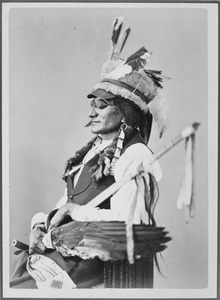Sihasapa

The Sihásapa or Blackfoot Sioux are a division of the Lakota people, Titonwan, or Teton.
Sihásapa is the Lakota word for "Blackfoot", whereas Siksiká has the same meaning in the Nitsitapi language, and, together with the Kainah and the Piikani forms the Nitsitapi Confederacy. As a result, the Sihásapa have the same English name as the Blackfoot Confederacy (correctly: Nitsitapi Confederacy), and the nations are sometimes confused with one another.
The Sihásapa lived in the western Dakotas on the Great Plains, and consequently are among the Plains Indians. Their official residence today is the Standing Rock Reservation[1] in North and South Dakota and the Cheyenne River Reservation in South Dakota, home also to the Itazipco (No Bows), the Minneconjou (People Who Live Near Water) and Oohenumpa (Two Kettle), all bands of the Lakota.
Historic Sihásapa thiyóšpaye or Bands
In 1880, John Grass provided a list of the bands (tiyóšpaye) of the Sihasapa:
- Sihasapa-Hkcha or Sihasapa qtca (“Real Blackfoot”)
- Kangi-shun Pegnake or Kanxicu pegnake (“Crow Feather Hair Ornaments” or “Wear raven feathers in their hair”)
- Glaglahecha or Glagla heca (“Slovenly”, “untidy” or “Too lazy to tie their moccasins”)
- Wazhazha or Wajaje (“Osage”), Kill Eagle’s Band
- Hohe (“Rebels, i.e. Assiniboine”)
- Wamnuga Owin or Wamnugaoin (“Cowrie-Shell Earrings” or “Shell ear ornaments or Pendants”)
Famous Sihásapa
- Cante Peta 'Fire Heart'
- Mahto Eennahpa 'White Bear'
- Magashapa 'Goose'
- Pezi 'Grass'
- Mahto Wakouah 'Charging Bear' alias Okihe Pezi 'Young Grass' alias 'John Grass'
- Wambli Kte 'Kill Eagle'
- Hohay
Notes
- ^ National Archives, Kansas City 1977. "Standing Rock Agency Record of Rations Issued 1885". Standing Rock Agency Rations Issue to Heads of Families by Bands 1885 (in English and Lakota). RG 75 Records of the Bureau of Indian Affairs Standing Rock Agency, Fort Yates, North Dakota Roll 5A. Retrieved 10 December 2015.
{{cite web}}: CS1 maint: numeric names: authors list (link)
References
- Anderson, Harry H. "An Investigation of the Early Bands of the Saone Group of Teton Sioux." Washington Academy of Sciences Journal 46, no. 3 (1956): 87-94.
- Robinson, Doane. "A History of the Dakota or Sioux Indians from Their Earliest Traditions and First Contact with White Men to the Final Settlement of the Last of Them Upon Reservations and Consequent Abandonment of the Old Tribal Life." South Dakota Historical Collections 2, Part 2 (1904): 1-523.
External links
- "Blackfoot Indian Tribe History". 9 July 2011. Retrieved 2012-01-14.
